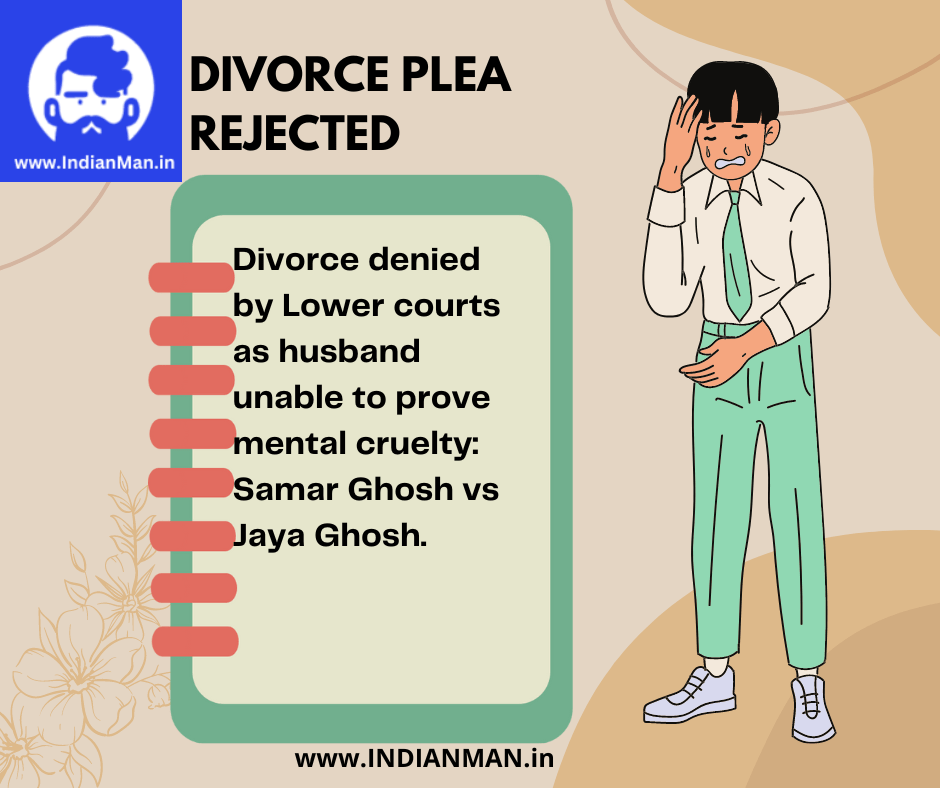Introduction
In recent years, many cases have highlighted the alleged bias against men in Indian matrimonial law. One such landmark case is Samar Ghosh vs Jaya Ghosh ((2007) 4 SCC 511). This emotionally engaging article will discuss the case in detail and shed light on the challenges faced by men in the Indian legal system. Mental Cruelty as a ground for divorce enied by Lower courts as husband unable to prove mental cruelty.
Background of the Divorce Case
Samar Ghosh and Jaya Ghosh were married for several years but eventually faced irreconcilable differences. Samar Ghosh filed for divorce on the grounds of mental cruelty, alleging that his wife’s behavior had caused him immense mental anguish. However, the lower courts denied the husband’s plea for divorce. Determined to seek justice, Samar Ghosh approached the Supreme Court of India.
Supreme Court’s Judgment: The Bias Against Men
The Supreme Court’s judgment in Samar Ghosh vs Jaya Ghosh recognized the concept of “mental cruelty” as a valid ground for divorce. However, the Court established a high threshold to prove mental cruelty, which has been criticized for being biased against men. The Court’s insistence on a higher level of proof for mental cruelty makes it difficult for men to obtain a divorce, even when they have legitimate grievances.
Emotional Impact on Men
The legal battle faced by Samar Ghosh in his quest for justice is a testament to the emotional toll such cases can take on men. The bias against men in matrimonial disputes can leave them feeling frustrated and helpless. As evident in this case, the husband sought relief from the alleged mental cruelty inflicted by his wife, but the legal system seemed to favor the wife.
The Need for Gender-Neutral Laws regarding divorce
The Samar Ghosh vs Jaya Ghosh case underscores the importance of gender-neutral laws in the Indian legal system. It is essential to recognize that both men and women can be victims of cruelty and abuse in a marriage. By setting a higher threshold for men to prove mental cruelty, the current laws contribute to a culture of discrimination and perpetuate gender stereotypes.
Redefining Mental Cruelty as a ground for divorce
In the Samar Ghosh vs Jaya Ghosh case, the Supreme Court attempted to redefine mental cruelty by providing an illustrative list of instances that may constitute mental cruelty. However, the list is non-exhaustive and leaves room for interpretation, which may result in inconsistencies in judgments. It is crucial for the legal system to establish clear guidelines on what constitutes mental cruelty to ensure that both men and women are treated fairly and equitably under the law.
Conclusion: Time for Change
The case of Samar Ghosh vs Jaya Ghosh is a landmark judgment that highlights the bias against men in Indian matrimonial law. The emotional impact of such cases on men cannot be understated. It is crucial for the legal system to adopt gender-neutral laws that protect the rights of both men and women equally.
In conclusion, the Samar Ghosh vs Jaya Ghosh case serves as a reminder of the challenges faced by men in the Indian legal system. The bias against men, particularly in matrimonial disputes, not only denies them justice but also takes a heavy emotional toll. It is time for change. The legal system must recognize and address this bias to ensure that both men and women are treated fairly and equitably under the law.



